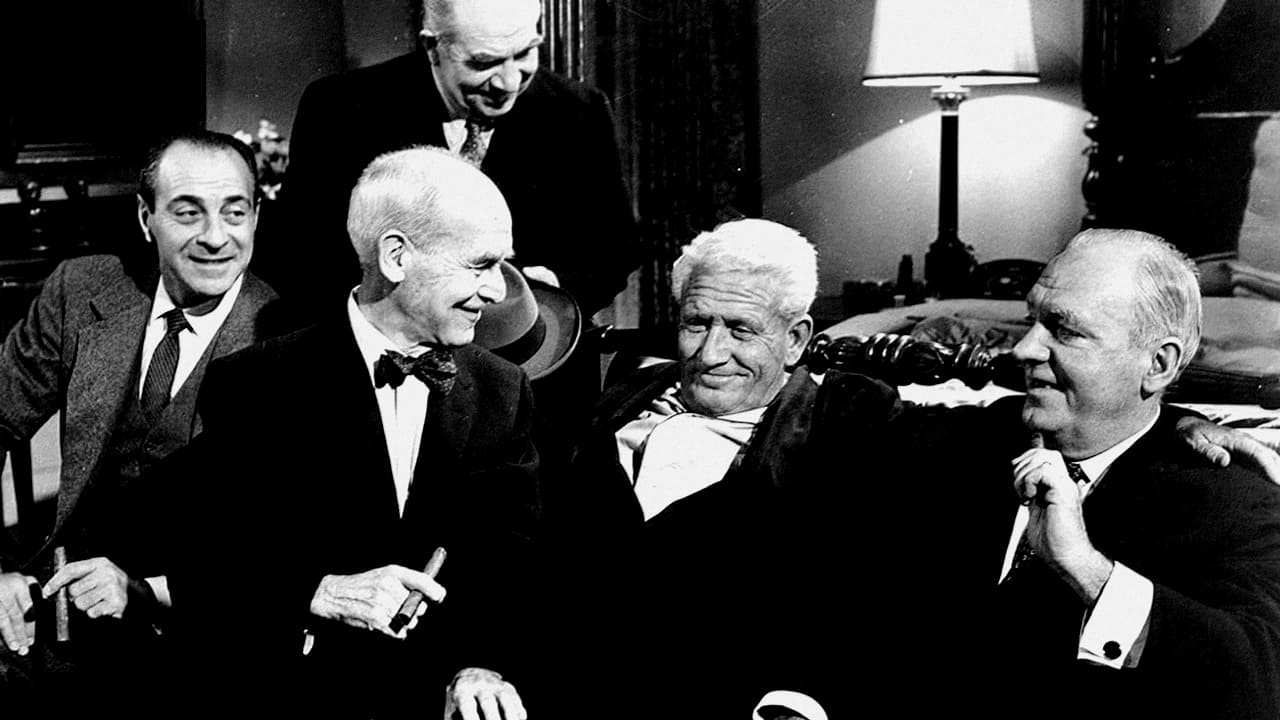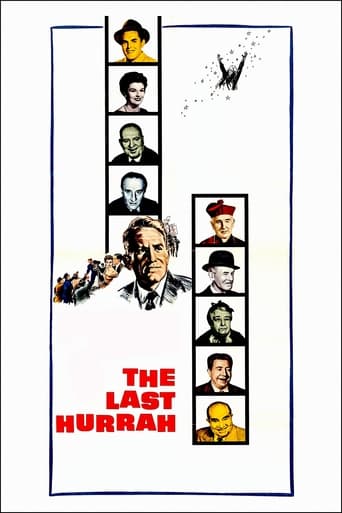



You won't be disappointed!
It’s an especially fun movie from a director and cast who are clearly having a good time allowing themselves to let loose.
View MoreI wanted to like it more than I actually did... But much of the humor totally escaped me and I walked out only mildly impressed.
View MoreThe movie's neither hopeful in contrived ways, nor hopeless in different contrived ways. Somehow it manages to be wonderful
View MoreSpencer Tracy stars as a beloved mayor making his last run for re-election. Tracy is fun to watch as always, there are a few nice shots and some crisp dialogue. The situations are fairly compelling. But once again, Ford's love of myth-making gets in the way, as the protagonist is built up as The Swellest Guy in the World while his opponents are all either snakes or boobs. The mayor is a working class hero who can do absolutely no wrong, always does the right thing for the right reasons, and the bad guys are crooked, selfish, out of touch bluebloods. And of course, there's the wacky oafish sidekick. This film is the answer to everyone who thinks MR. SMITH GOES TO WASHINGTON lacks nuance. I suppose some people are comforted by such a black and white view of the world, it just makes me roll my eyes.
View MoreIn his lifetime, Spencer Tracy received nine Academy Award nominations. Winning twice, in 1937 for "Captain's Courageous" and in 1938 for "Boys Town", he was the first actor to win back-to-back Oscars.In 1958 two films, both based upon best selling novels were released. The first of these was a screen adaptation of Ernest Hemingway's "The Old Man and the Sea", the story of a lone, Cuban fisherman and his solitary fight to 'land the big one.'The second film was a transcription of Edwin O'Connor's look at Irish-American politics in "The Last Hurrah!", Tracy received an Oscar nomination for the former, but should he have been honoured for the latter instead?In "The Old Man and the Sea", Tracy is alone for most of the film's 86 minute running time. A glorious opportunity to show off one's acting chops, having that much screen time to yourself is also a major challenge because it requires the actor to dig deep to maintain our interest since there is no one off of whom he can play. With "The Last Hurrah!", the opposite is true as Tracy is surrounded by a veteran group of scene-stealer's (Basil Rathbone, John Carradine, Edward Brophy, Donald Crisp, Jane Darwell and Anna Lee just to name a few) who challenge him (and us) to keep the focus where it belongs. In each film, loneliness and isolation is a central metaphor. In the Hemingway story, the old, Cuban fisherman, in his rickety, old boat must land 'the big fish' alone and then, alone, fight off 'the sharks' who want to rob him of it. As O'Connor's Mayor Frank Skeffington, he is still alone and isolated, from the modern (and crass) world of his son and political opponents plus he is also unable to give up the old ways that propelled and kept in office even though he knows the days for those old ways are numbered. That he becomes all- too-acutely aware of the accuracy of his perceptions is brilliantly confirmed in one of the cinema's most stunning shots, Skeffington's walk home, alone, after the results of the election are in.For this viewer at least, Hemingway's old man is a skeletal, boring, old man, thus robbing Tracy, gifted actor though he was, of the tools he needed to make him cinematically interesting. O'Connor's Frank Skeffington, on the other hand is much more finally nuanced. A flesh and blood, skin and bone, sinew and tissue firebrand, he is at times almost repulsively sentimental, harsh, kind, churlish, generous, vindictive and opportunistic. In other words, there is real meat here with Tracy, the consummate actor making a feast of it. Was Spencer Tracy nominated for the wrong film in 1958? Yes, I would say he was even though I doubt he would have defeated winner David Niven for his brilliant turn in "Separate Tables".
View MoreTracy plays Irish-American Frank Skeffington, an old hand re-seeking political office for one last time, with dreams of helping the slums along, and, along with his cronies, leading the victory parade on St Patrick's Day. Will he make it? 'The Last Hurrah' is a tour-de-force, with John Ford's sharp direction, and several old timers making an appearance, such as Basil Rathbone as one of Tracy's more vehement opponents. Tracy of course is as excellent as ever, and there are some nice scenes between him and Jeffrey Hunter (playing his nephew).Whether showcasing the camaraderie between Skeffington and his supporters, or giving the viewer a masterclass in acting, 'The Last Hurrah' cannot really be faulted. Even if the last half-hour of the film is a bit cloying, Tracy's last line is on target and raises a smile as the end card comes up.Incidentally, this film was made in 1958, a time when black and white films mixed with those in colour to no-one's detriment. It would be interesting to see if a similar subject would come across as well today, in colour. It makes one long for the return of black and white for some genres.
View MoreIn the early 1930s John Ford directed a relatively unknown actor in a forgotten film called UP THE RIVER, about prison. After that effort they went their separate ways, Ford usually directing at 20th Century Fox, Republic, and other studios (RKO for MARY OF Scotland), but rarely at MGM. And when he was developing into Hollywood's greatest director, Tracy, after an initially unrewarding period at Fox, went to MGM and became their leading actor-star. But neither managed to find a project to do with the other. Then in 1958 Ford approached Tracy to play Mayor Frank Skeffington, the hero of Edwin O'Connor's novel THE LAST HURRAH. This time, with both director and actor at their peaks, the result was far more memorable than UP THE RIVER had been.O'Connor's novel (a best seller in it's day) was a fictionalization of parts of the career of James Michael Curley, a man who became synonymous with the city of Boston. Boston's laws were peculiar regarding electing Mayors. After some bad experiences in the 19th and early 20th Century, the city decided that Mayors could not have consecutive terms in office - that they could serve as Mayor frequently but (like Grover Cleveland's two terms as President) not one term following another. This was okay with Curley, who ended up the most re-elected Mayor in Boston, serving four terms (each four years in length) over a period of two and a half decades, with a two year term as Governor of Massachusetts as well. A remarkable career for his day or any day. He was corrupt as they come - but he always pointed out that his corruption benefited the public (usually it did). It was like the old Tammany Hall dictum of their Sachem George Washington Plunkitt about good graft and bad graft. Good graft enabled the construction of roads, repairs of streets, public building projects (that were needed), bridges, tunnels, etc. In short, they enhanced or helped the city. Bad graft was like stealing the tin roof of the town orphanage to sell it to a metal dealer! Boston had many improvements under Curley, but plenty of pay-offs. Yet, he was a master at manipulating public opinion. The Irish and other ethnic groups (including Jews and African-Americans) became his voting blocks because the conservative opposition was hide-bound old Puritan - Yankee (and old money), and anti-minority. It worked like a charm for Boss Curley. It got him to the state house. It was only towards the end of his career (when he got involved in a postal fraud) that he went to prison for two years. He left prison and was re-elected Mayor of Boston!The novel emphasized the more "hamish" elements of Curley's success. His ability to have loyal lieutenants (here played by Pat O'Brien, Ricardo Cortez, James Gleason, and Ed Brophy as his gopher "Ditto") and to have loyal friends (even including opponents) like Anna Lee, Wallace Ford (as a crank political rival), Frank McHugh, and Jane Darwell. Even some of his critics like and respect him (even if they don't always support him), such as the Cardinal (Donald Crisp) and the local Episcopal Bishop (Basil Ruysdael). Tracy basks in this warmth, as well as that of his nephew Jeffey Hunter. It's good he has it, as his son (Arthur Walsh) is a total wash-out as an emotional support (the boy just likes dating pretty girls, going golfing, and hearing jazz). Tracy invites Hunter to follow the last campaign. He is smart enough to realize that this mayoralty campaign is the last of the old time, political clubhouse type elections. Tracy has noted the rising media of television and radio, and knows in a few years they will dictate the political future. Ford captures this horrible future well, showing the inept, wooden candidate McCloskey, with his wooden wife and kids (four of them), and a rented dog they don't like, on television. It's a rich film, and a warm one. The villains are evenly dispensed - Basil Rathbone as banker Norman Cass, John Carridine as editor Amos Force, Willis Bouchey as Roger Segrue are a trio of types, but each is different. Rathbone is a patrician, and dislikes Tracy for his background (he represents the loss of the patrician class's power to the lower classes). Carridine simply hates him for a piece of bigoted history on his own family's part. Segrue demonstrates that intolerance can be found in the Catholics as well as the Protestants. But there are differences. Rathbone, fed up with his ally Carridine at one point for his suggesting the banker could have put pressure on Ruysdael on a political matter, shoots a cutting statement that if it was up to Carridine (a former member of the Ku Klux Klan) they'd be burning a cross in the bishop's front lawn!The film ends with Bouchey suggesting that if Skeffington had it all to do he would do it differently. Skeffington smiles, and says "Like Hell I would!". When the novel came out James Michael Curley was still alive, and angry...he threatened to sue. But then he noticed the public liked this friendlier image of himself from the novel. He dropped the lawsuit, and wrote his memoirs. He entitled the memoirs, "I'D DO IT AGAIN!"
View More